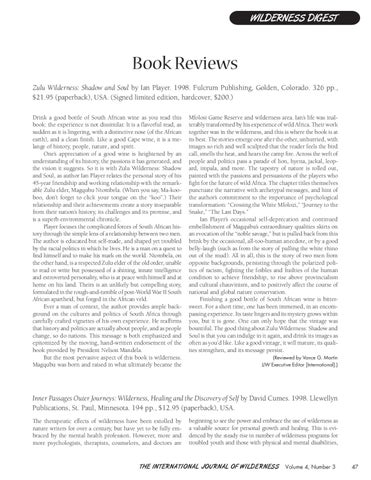WILDERNESS DIGEST
Book Reviews Zulu Wilderness: Shadow and Soul by Ian Player. 1998. Fulcrum Publishing, Golden, Colorado. 326 pp., $21.95 (paperback), USA. (Signed limited edition, hardcover, $200.) Drink a good bottle of South African wine as you read this book: the experience is not dissimilar. It is a flavorful read, as sudden as it is lingering, with a distinctive nose (of the African earth), and a clean finish. Like a good Cape wine, it is a melange of history, people, nature, and spirit. One’s appreciation of a good wine is heightened by an understanding of its history, the passions it has generated, and the vision it suggests. So it is with Zulu Wilderness: Shadow and Soul, as author Ian Player relates the personal story of his 45-year friendship and working relationship with the remarkable Zulu elder, Magqubu Ntombela. (When you say, Ma-kooboo, don’t forget to click your tongue on the “koo”.) Their relationship and their achievements create a story inseparable from their nation’s history, its challenges and its promise, and is a superb environmental chronicle. Player focuses the complicated forces of South African history through the simple lens of a relationship between two men. The author is educated but self-made, and shaped yet troubled by the racial politics in which he lives. He is a man on a quest to find himself and to make his mark on the world. Ntombela, on the other hand, is a respected Zulu elder of the old order, unable to read or write but possessed of a shining, innate intelligence and extroverted personality, who is at peace with himself and at home on his land. Theirs is an unlikely but compelling story, formulated in the rough-and-tumble of post-World War II South African apartheid, but forged in the African veld. Ever a man of context, the author provides ample background on the cultures and politics of South Africa through carefully crafted vignettes of his own experience. He reaffirms that history and politics are actually about people, and as people change, so do nations. This message is both emphasized and epitomized by the moving, hand-written endorsement of the book provided by President Nelson Mandela. But the most pervasive aspect of this book is wilderness. Magqubu was born and raised in what ultimately became the
Mfolosi Game Reserve and wilderness area. Ian’s life was inalterably transformed by his experience of wild Africa. Their work together was in the wilderness, and this is where the book is at its best. The stories emerge one after the other, unhurried, with images so rich and well sculpted that the reader feels the bird call, smells the heat, and hears the camp fire. Across the weft of people and politics pass a parade of lion, hyena, jackal, leopard, impala, and more. The tapestry of nature is rolled out, painted with the passions and persuasions of the players who fight for the future of wild Africa. The chapter titles themselves punctuate the narrative with archetypal messages, and hint of the author’s commitment to the importance of psychological transformation: “Crossing the White Mfolozi,” “Journey to the Snake,” “The Last Days.” Ian Player’s occasional self-deprecation and continued embellishment of Magqubu’s extraordinary qualities skirts on an evocation of the “noble savage,” but is pulled back from this brink by the occasional, all-too-human anecdote, or by a good belly-laugh (such as from the story of pulling the white rhino out of the mud). All in all, this is the story of two men from opposite backgrounds, persisting through the polarized politics of racism, fighting the foibles and frailties of the human condition to achieve friendship, to rise above provincialism and cultural chauvinism, and to positively affect the course of national and global nature conservation. Finishing a good bottle of South African wine is bittersweet. For a short time, one has been immersed, in an encompassing experience. Its taste lingers and its mystery grows within you, but it is gone. One can only hope that the vintage was bountiful. The good thing about Zulu Wilderness: Shadow and Soul is that you can indulge in it again, and drink its images as often as you’d like. Like a good vintage, it will mature, its qualities strengthen, and its message persist. (Reviewed by Vance G. Martin IJW Executive Editor [International].)
Inner Passages Outer Journeys: Wilderness, Healing and the Discovery of Self by David Cumes. 1998. Llewellyn Publications, St. Paul, Minnesota. 194 pp., $12.95 (paperback), USA. The therapeutic effects of wilderness have been extolled by nature writers for over a century, but have yet to be fully embraced by the mental health profession. However, more and more psychologists, therapists, counselors, and doctors are
beginning to see the power and embrace the use of wilderness as a valuable source for personal growth and healing. This is evidenced by the steady rise in number of wilderness programs for troubled youth and those with physical and mental disabilities,
THE IN TERNA TI ONAL J OU RNAL OF WILDERNESS Volume 4, Number 3
47
